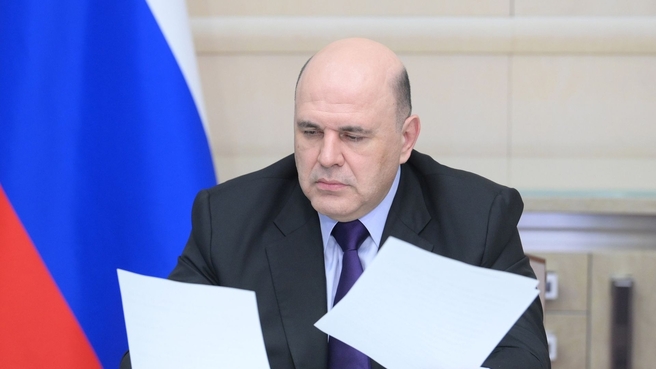Agenda: easy credit terms for procurement of priority imports; establishing the Compulsory Pension and Social Insurance Fund; relaxing liability of businesses for administrative violations; supporting air cargo operations; developing a system for the prompt issuance of Government regulatory and legal acts; and the results of the heating season and preparations of the housing and utility companies and energy companies for the autumn and winter seasons.
Mikhail Mishustin’s opening remarks:
Good afternoon, colleagues.
Before we start on the main agenda, I would like to announce an important decision. The President earlier set a task to saturate the economy with liquidity and provide additional resources to ensure the uninterrupted operation of our companies.
In the current circumstances, many companies have to quickly restructure their production chains and look for new suppliers of raw materials, components and equipment while available amounts of goods in the market are not so easy to find. Right now, this work requires significant effort and often incurs high costs.
In order to reduce the cost of purchasing priority imports, the Government is launching a special concessional lending programme. A resolution has been signed to this effect. The loan formula will be as follows: 30 percent of the Bank of Russia’s key rate plus 3 percentage points. Currently, it is just over 7 percent. Banks will be compensated for the difference with subsidies from the federal budget. The loan term will depend on its purpose. A loan to buy raw materials or components will be granted for one year, and for equipment or production tools for three years.
We expect that this kind of support will help companies reduce current costs, fix supplies of all essential goods and resources, and continue their consistent development.
Now let’s turn to the agenda.
The Government continues to reduce administrative expenses and develop convenient services for people and businesses.
Today we will discuss a large package of documents that will allow us to combine in a single structure two state extra-budget funds – the Pension Fund and the Social Insurance Fund, and introduce the necessary amendments into law for this purpose. Next year, Russia will have a uniform Fund for Mandatory Pension and Social Insurance.
Right now, most federal support measures are processed through these funds. Merging them will help simplify payment processes. Payments will be released proactively based on social treasury parameters, that is, automatically or after a single application.
Common client services will be established within the existing territorial system. Business and administrative processes and related expenses will be streamlined. Common parameters for calculating premiums for state extra-budget funds will be determined. This will make it possible to increase maximum insurance payments in the event of a temporary disability or in connection with maternity.
Employees under civil law contracts will be paid for sick leave, pregnancy, childbirth and childcare for babies to 1.5 years old. They will receive the same benefits as those working under labour contracts.
Starting next year, the authorities will establish a uniform tariff system for insurance payments that employers will transfer to the mandatory pension, social and medical insurance accounts of their personnel.
We hope this step will allow businesses to reduce administrative costs, mainly because owners will only have to complete one payment form instead of several. This will help reduce the number of reporting indicators and, thus, the number of errors in calculations and the likelihood of fines. The Federal Treasury will be in charge of distributing funds in various areas.
Next, at the President’s initiative, amendments to the Code of Administrative Offences have been drafted, which will mitigate businesses’ responsibility for compliance violations. For example, the first minor infraction identified during an inspection will result in a warning, not a fine.
The Russian economy is changing and enterprises are adapting to the new circumstances as they change their suppliers and enter new markets. It is important to support this by reducing the administrative burden.
The role of the commissioners for the protection of entrepreneurs’ rights in the regions will increase significantly as well. The draft law codifies the possibility of their participation in considering cases as defenders and establishes liability for creating obstacles to their work. This package of amendments and other government measures to support businesses will allow entrepreneurs to spend more time doing their work and will help create new jobs and high-quality competitive products and services.
The next question is on providing additional support for air services, which have been seriously impacted by the external restrictions. Unfriendly countries have made it illegal for Russian airlines to fly on many international routes. To stabilise the situation, a financial mechanism was recently adopted to stimulate domestic passenger service. We will now introduce a similar measure for cargo carriers. We have unique companies with extensive experience in this narrow segment and, most importantly, highly skilled staff, which we cannot afford to lose.
The Government will allocate almost 3 billion roubles this year to partially reimburse their expenses. This programme will cover cargo flights made from April through October. This decision will help reorient the existing fleet of cargo aircraft to the transport needs of Russian customers.
I want Minister of Transport Vitaly Savelyev to take this issue under his personal control.
Before we move on to the discussion, I would also like to spend a moment to discuss the preparation and adoption of the legal acts that are required for the implementation of federal laws. This is the direct responsibility of the Government, ministries and departments.












